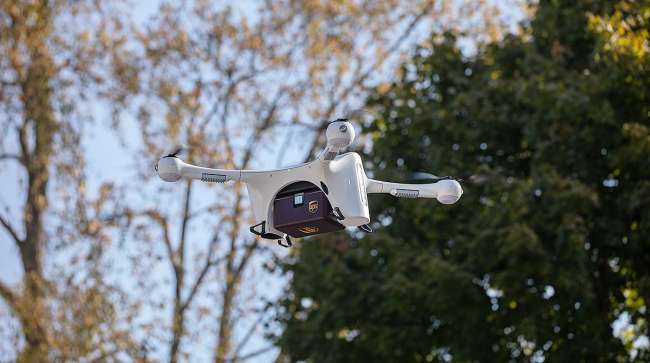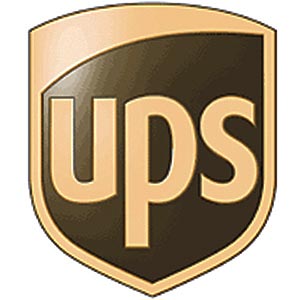UPS, AmerisourceBergen Plan Drone Drug and Device Delivery

[Stay on top of transportation news: Get TTNews in your inbox.]
UPS Inc. and AmerisourceBergen, the Chesterbrook, Pa.-based drug distributor, are working together to use UPS’ new Flight Forward “drone airline” to ship drugs and supplies to hospitals through small, unmanned aircraft across the U.S.
UPS announced it already was using drones in North Carolina and would soon start employing them in Utah. The company plans a national rollout soon.
#Drone expansions, healthcare technology and more #smallbiz solutions than ever. We are moving fast to create a better future for our customers. See our most recent announcements here. #UPSdrones
— UPS (@UPS) October 21, 2019
The pieces were falling in place Oct. 21 when UPS said the Federal Aviation Administration has approved the drone service to fly beyond its operators’ direct line of vision. The company is speeding plans to start deliveries to hospitals and other service providers.
The company also is planning new health care support locations. A UPS source and a construction source say the company has been in discussions over a Northeast Philadelphia property on Red Lion Road formerly used by Budd Co. and considered by drugmaker Teva for a warehouse compound, now that UPS has begun considering more urban sites.
Labor supply has become a more important issue for UPS and other warehouse operators as the unemployment rate drops. But UPS and the site’s owners say no decision has been reached.
The company said last week that it is consolidating its fast-growing medical-services units and brands into a new business group, UPS Healthcare and Life Sciences, which will employ 5,000 of UPS’ 362,000 U.S. staff. The company also employs about 80,000 abroad.
UPS and Amerisource want to use “unmanned aviation” to replace ground courier vehicle contractors “to transport the majority of medical products.” These would be items moving from Amerisource’s distribution centers to hospitals, doctors’ offices, pharmacies, nursing homes, and other locations, the companies said in a statement.

Other UPS News
Along with reducing reliance on UPS contracted couriers, the companies hope UPS drones will avoid road traffic and drop costs. Scott Price, UPS chief transformation officer, said drone delivery will be faster. Amerisource says it serves 95% of U.S. hospitals through its centers in Thorofare and 26 other cities.
Drones give UPS “tremendous flexibility” that will “improve efficiency,” cutting delivery costs, said Bob Mauch, a group president at AmerisourceBergen, in a statement.
UPS said it has started working with drone-maker Matternet to test flying specimens and instruments at the University of Utah Health campus in Salt Lake City. UPS said it already has flown more than 1,500 flights using Matternet drones around the WakeMed Hospital campus in North Carolina.
The company also will work with CVS Health, which runs one of the largest U.S. pharmacy and drug distribution networks, to develop drone delivery plans, including potential service to patients’ homes.
UPS moves drugs and medical devices through a specialized warehouse network, including facilities near Swedesboro, and Pedricktown, N.J., totaling half a million square feet, a short drive south of AmerisourceBergen’s West Deptford, N.J., center.
At Swedesboro, manufacturers such as Medtronic stock many thousands of items for rapid dispatch. “Swedesboro is within 200 miles of 400 hospitals,” said Dan Gagnon, UPS vice president for health care logistics and strategy.
Couriers are dispatched at all hours. A force of around 80 nonunion workers, earning $13 to $15 an hour, spend their days maintaining inventory in towering storage stacks and rechecking surgical stent kits, replacement knees, and other complex packages for delivery as needed in Philadelphia operating rooms. That’s where Medtronic and other manufacturers station representatives who order additional parts from UPS as needed.
UPS officials said they are helping manufacturers require doctors and hospitals to accept standardized products and procedure kits, using methods that have driven down costs in other industries. “Problems we solved 20 years ago in high-tech, we are solving now in [health care] logistics,” said David O’Leary, UPS vice president for logistics and distribution on a visit to the Swedesboro center earlier this month.
Health care costs have been rising faster than median incomes for more than 20 years. “It’s unsustainable,” said Gagnon. “And chronic diseases have been growing — cancer, respiratory, cardiac, diabetes. Innovation in health care has extended these patients’ lives. If you get these diseases, you may live another 40 years” as medicine advances.
More treatment has meant much higher costs, due to a “fragmented” supply chain drawing doctors’ favored products from many sources — because “clinicians, not logisticians, have been running health care,” Gagnon said.
That’s ripe to change: “Consumers now expect health care to be as convenient as other products,” and UPS says its flying delivery machines, backed by specialized warehouses, will make that happen.
UPS ranks No. 1 on the Transport Topics Top 100 list of for-hire carriers in North America.
Want more news? Listen to today's daily briefing:
Distributed by Tribune Content Agency, LLC

